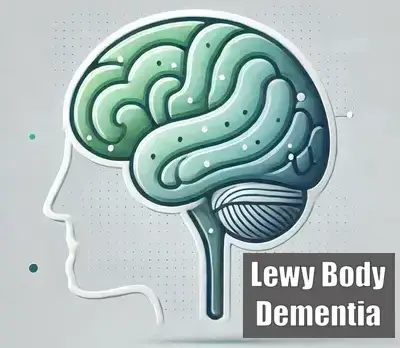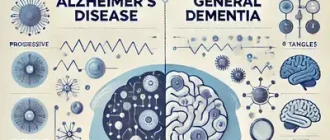Lewy body dementia (LBD) is a progressive neurological disorder caused by the abnormal buildup of a protein called alpha-synuclein in the brain. These protein deposits, known as Lewy bodies, interfere with normal brain function, leading to cognitive decline, motor symptoms, and behavioral changes.
Stages of Cognitive Decline in LBD
| Stage | Key Symptoms |
|---|---|
| Early Stage | Mild memory lapses, occasional confusion, visual hallucinations |
| Middle Stage | Increased confusion, motor difficulties, persistent hallucinations |
| Late Stage | Severe cognitive impairment, loss of motor function, difficulty communicating |
This chart outlines the progression of cognitive decline in Lewy body dementia (LBD), highlighting key symptoms at each stage. Recognizing these stages can aid in timely diagnosis and care planning.
Understanding how someone develops LBD involves exploring risk factors and the underlying mechanisms. Here’s a detailed explanation:
Causes of Lewy Body Dementia
The exact cause of LBD is not fully understood, but it likely results from a combination of genetic, environmental, and age-related factors:
- Protein Misfolding: Alpha-synuclein proteins, which normally play a role in neuron communication and synaptic function, misfold and form toxic clumps. These accumulations disrupt cellular processes, including the transport of nutrients and waste. Studies have shown that misfolded alpha-synuclein can spread to other brain cells, exacerbating damage. An example of its impact is seen in the substantia nigra region, where it contributes to movement-related symptoms akin to Parkinson’s disease.
- Neurodegeneration: Over time, these toxic protein deposits cause irreversible brain cell damage and death. This is especially evident in the cerebral cortex (responsible for thinking and memory) and the basal ganglia (affecting movement and coordination). Research by neurologists like Dr. Bradley Boeve of the Mayo Clinic suggests that this degeneration underlies the hallmark cognitive and motor impairments seen in LBD patients.
- Genetic Influence: Certain genetic mutations, such as in the GBA or SNCA genes, significantly elevate the risk of developing LBD. For instance, mutations in the GBA gene, which are also linked to Gaucher’s disease, impair the cell’s ability to break down and recycle proteins. While hereditary cases are rare, individuals with these mutations are more likely to exhibit earlier onset and rapid progression of symptoms.
Risk Factors for LBD
While the direct cause is unclear, several risk factors have been identified:
- Age: LBD is most commonly diagnosed in people over the age of 60. For example, a 2019 study in the U.S. found that the average age of onset is around 75, with symptoms often appearing in the early 70s.
- Sex: Males may have a slightly higher risk than females. One clinical review noted that men account for about 60% of LBD diagnoses, possibly due to differences in genetic susceptibility or hormone-related factors.
- Family History: A family history of Parkinson’s disease, Alzheimer’s disease, or dementia increases the likelihood. For instance, individuals with a parent or sibling affected by these conditions may have a twofold higher risk.
- Lifestyle Factors: Exposure to toxins, head injuries, or cardiovascular issues like hypertension may contribute. A notable case involved workers exposed to pesticides who demonstrated a higher incidence of LBD compared to the general population. Similarly, NFL players with a history of repeated concussions are being studied for their elevated risk of dementia-related illnesses, including LBD.
Symptoms That Indicate LBD
Lewy body dementia manifests through a combination of cognitive, motor, and behavioral symptoms:
- Cognitive Decline: Memory problems, confusion, and reduced problem-solving skills. People might notice difficulty in recalling recent events or tasks, misplacing items frequently, or struggling to follow conversations or instructions.
- Visual Hallucinations: A hallmark symptom, often occurring early in the disease. These can include seeing people, animals, or objects that aren’t there. For example, someone might report vivid images of a person standing in the room when no one is present.
- Parkinsonian Symptoms: Tremors, muscle rigidity, and slowed movements. An individual might feel stiffness in the limbs, experience shuffling while walking, or struggle to maintain balance.
- Fluctuating Alertness: Sudden changes in attention or drowsiness. For instance, someone might appear highly alert one moment and then become drowsy or unresponsive the next, which can be confusing for caregivers.
- Sleep Disorders: REM sleep behavior disorder (acting out dreams). This might include yelling, kicking, or flailing during sleep, which can sometimes result in injuries to the individual or their bed partner.
Prevalence of LBD Symptoms in Patients
| Symptom | Prevalence (%) |
|---|---|
| Visual Hallucinations | 80% |
| Fluctuating Cognition | 70% |
| REM Sleep Behavior Disorder | 60% |
| Parkinsonian Symptoms | 50% |
| Severe Memory Loss | 40% |
This chart highlights the prevalence of key symptoms in patients with Lewy body dementia (LBD), providing a clear view of common clinical presentations.
Diagnosis and Early Detection
LBD is challenging to diagnose due to overlapping symptoms with other disorders like Alzheimer’s or Parkinson’s. Diagnosis typically involves:
- Neurological Examination: Evaluating motor and cognitive functions. This method is straightforward and typically involves a neurologist conducting tests to assess reflexes, coordination, memory, and problem-solving abilities. It is highly accurate in identifying symptoms but does not confirm LBD alone. It usually takes 1-2 hours and costs $200-$400 per session.
- Imaging Tests: MRI or PET scans to identify brain changes. These tests can detect brain atrophy or reduced dopamine activity in specific regions, both of which are indicative of LBD. PET scans, while more accurate (around 85% specificity), are expensive, often costing $3,000-$6,000, and take about 30-60 minutes. MRI is less costly at $1,000-$2,000 but may miss early-stage changes.
- Sleep Studies: Detecting REM sleep behavior disorders. Polysomnography, the gold standard for sleep analysis, is often used. It has a high diagnostic accuracy for detecting REM sleep disorders, with 90% sensitivity. The study typically lasts overnight and costs $800-$1,500.
- Biomarker Tests: Research is ongoing for identifying biomarkers in cerebrospinal fluid or blood. These tests show promise, with early studies indicating an 85-90% accuracy in differentiating LBD from Alzheimer’s disease. However, they are currently experimental, expensive ($500-$1,000), and require lumbar punctures, which can be invasive and uncomfortable.
Preventive Measures and Management
There is no guaranteed way to prevent LBD, but certain strategies may reduce the risk:
- Healthy Lifestyle Choices: Regular exercise, a balanced diet, and a complete cessation of smoking and alcohol consumption. Both smoking and alcohol are significant contributors to neurodegeneration and vascular issues, which exacerbate the risk of LBD. Avoiding these entirely is crucial for reducing risk.
- Mental Stimulation: Engaging in cognitive activities like reading or puzzles. For older adults, joining a local book club, attending community center workshops, or using large-print puzzle books can be effective and accessible options. Digital brain-training apps with user-friendly interfaces for seniors, such as Lumosity, are also helpful.
- Managing Health Conditions: Controlling diabetes, high blood pressure, and cholesterol. For example, a senior might work with a dietitian to plan meals that reduce salt and sugar intake, or participate in gentle exercise programs like chair yoga or water aerobics, which are often offered at community centers for seniors.
- Early Medical Intervention: Seeking help for symptoms like memory loss or movement issues. Regular check-ups with a primary care physician can help identify early warning signs. Seniors might also benefit from telehealth services for consultations, particularly if mobility is an issue.
Treatment Options
While there is no cure for LBD, treatments focus on managing symptoms:
Medications
- Cognitive Symptoms: Cholinesterase inhibitors, such as donepezil (Aricept) and rivastigmine (Exelon), improve communication between nerve cells by increasing levels of acetylcholine, a neurotransmitter. These are commonly prescribed to manage memory loss and confusion.
- Mood Disorders: Selective serotonin reuptake inhibitors (SSRIs), like sertraline (Zoloft) or citalopram (Celexa), help alleviate depression and anxiety.
- Motor Symptoms: Levodopa, commonly used in Parkinson’s disease, can reduce stiffness and improve movement, though it may exacerbate hallucinations.
- Costs: Generic cholinesterase inhibitors cost $30-$70 per month, while branded versions can exceed $300.
Therapies
- Physical Therapy: Tailored exercises help maintain mobility and address rigidity. Activities may include stretching, walking aids, or balance training.
- Occupational Therapy: Focuses on daily tasks like dressing or cooking, using adaptations to match patient abilities.
- Speech Therapy: Addresses issues with swallowing or communication through tailored exercises and swallowing techniques.
- Costs: Therapy sessions range from $50-$150 per hour and are typically scheduled weekly.
Supportive Care
- Involvement of caregivers and support groups is crucial for patients and families.
Effectiveness of Treatment Options for LBD
This horizontal bar chart highlights the effectiveness of various treatment options for Lewy body dementia (LBD), showing the relative benefits of medications and therapies.
Final Thoughts
Lewy body dementia is a complex disorder with no single known cause. Understanding its risk factors, symptoms, and progression can help in early detection and better management. If you or a loved one experiences symptoms associated with LBD, consult a healthcare provider for an accurate diagnosis and a personalized care plan.
Comparison of Dementia Types
| Type | Age of Onset | Key Symptoms | Progression Speed |
|---|---|---|---|
| Alzheimer’s Disease | 65+ | Memory loss, confusion, difficulty planning | Slow |
| Lewy Body Dementia | 50-85 | Visual hallucinations, motor symptoms, fluctuating cognition | Moderate |
| Vascular Dementia | 55+ | Poor judgment, slowed thinking, mood changes | Variable |
| Frontotemporal Dementia | 45-65 | Behavioral changes, language issues, apathy | Fast |
This table compares key aspects of different types of dementia, including age of onset, symptoms, and progression speed, providing a clear overview for understanding the distinctions between these conditions.
About the Author
Reyus Mammadli is the author of this health blog since 2008. With a background in medical and biotechnical devices, he has over 15 years of experience working with medical literature and expert guidelines from WHO, CDC, Mayo Clinic, and others. His goal is to present clear, accurate health information for everyday readers — not as a substitute for medical advice.







